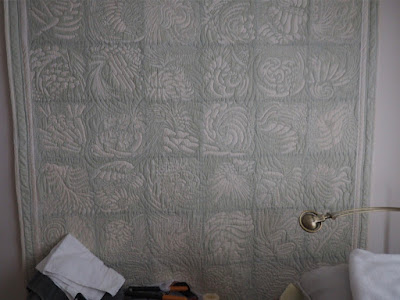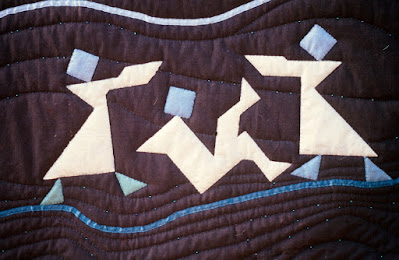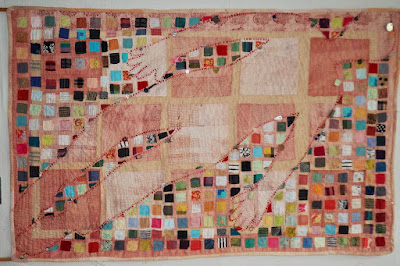The first one was inspired by learning from Barbara Heller how to do batik. I bought a special brush in Chinatown & started to work on square white pieces of cotton broadcloth. I called it Sea Foam. My rule for each square: '3 brush-stroke ideas'.
Eventually I gave the Sea Foam quilt to Leslie Alexander. By that time it had faded greatly & looked like this.
After Leslie died I gave the quilt to Robin, my niece.
This next one I called In a Kite Sky. My inspiration were the sky colors I so often saw crossing the Lion's Gate Bridge.
Inspired by a book of tangram figures Anna Banana got me in Holland, I made a quilt by stenciling dancers onto black cloth.
Hence Tangram Dancers.
[Tangrams are made using only 7 shapes: 2 squares, 1 parallelogram, & 4 triangles. The simplest puzzle done with them is creating a square.]
This quilt also faded!
I made this one by printing on whole-cloth using acrylic paint & a chopstick for the dots. I was totally in love with Aboriginal Australian work, having been newly introduced to it.
(detail)
The quilting from the back was so lovely. (These 3 photos taken in 3 different times.)
The quilt below happened because of a confluence. Stephen Denslow used dancing images somewhat like this. I made stampers for heads, hands, lips, eyes & leaves; patterns for pants, shirts, dresses, & trees. I think I also found some sequined stars for the sky. Naomi Wortis was marrying Homer Passi & this was my gift to them. She said they had danced under the sky in Zaire (then) when she was in the Peace Corps there.
Another stencil project, this time while working with indigo dye.
The central blue rectangle is one piece of cloth. The plier stencil was applied first with cassava paste so the pliers are the whitest. The shears where applied after one dying session, hence they are light blue.
The border was an unfortunate artistic decision, I now think.
I never got a photo of the whole finished quilt below. This project was done as a farewell gift to a beloved vice-principal when she left Moberly School. Each teacher was given a square piece of paper, good scissors, & hole punches to work with. Our work zone was, over a period of time, in the staff room. I silk-screened each staff member's 'snow flake' onto a cotton square & also onto a hand made paper sheet. With the paper a book was made & a page for each participating teacher who could say goodbye to Sandra Philips in his/her own words.
A classroom project with spatter paint & student made butterflies was done in that period. It hung in the staffroom after I left the school.
2 chicken quilts.
#1 inspired by a greeting card with this sort of chicken.
Chicken Quilt #2 done in a hand stitching class with Dorothy Caldwell. Each day I made a different chicken. At then end of the course she had us do an exercise where we sewed with our 'wrong' hand while blindfolded. Hence the chicken track stitching!
Black & white watersnakes filmed off the coast of Madagascar were the idea that really made this quilt take off. The 'background' was a whole-cloth paste-resist dying that included the leaf stencil used 4 times.
(Sorry, I should have cropped away the black. I hung it on a black cloth to photograph it.)
I took apart some Peruvian dolls, because I was curious about what they were made of & how they were assembled. What I discovered gradually was that ancient textiles were being sewn into 'tourista dolls'. That's a bit of a scandal. I called it Old Textiles, New Text.
See those super shapes below? Armhole offcuts from Maiwa shirts! (I have a shirt from that cloth.) The color choices came from some marvelous spring bush, hence an overall floral theme.
I include this image below because it so clearly shows what a difference hand-quilting makes.
For a Weaving Symposium in Vancouver years ago I 'wove up' two sleeves I had. I wove them into some of my hand-dyed cloth. Here's one of them. Hyper-Weave Sleeve!
I printed with many varieties of oak leaves. This one is one my early forays into machine quilting.
Two body quilts: mine (first the unfinished piece& then completed much later) (& chopstick dots again for an outline)
Then later during Covid it was reworked.
I'm not sure of the success of this effort, but it is a quilt that holds many memorable cloth scraps & small items from my life, as part of my outline. I think of them as my Milagros.
The 2nd outline body quilt is of my granddaughter Lucy's body from several years ago.
I took a photo of her face & enlarged it for embroidery work, so her features are pretty accurate!
As I have been doing these last 3 blog entries, I am reviewing how much fun each of these projects was. That's good because I have been feeling myself to be in somewhat of a non-productive period. What's compelling to re-cognize is how many different inspiration sources there have been in my 60 years of working with cloth.
That's it for now.



























































